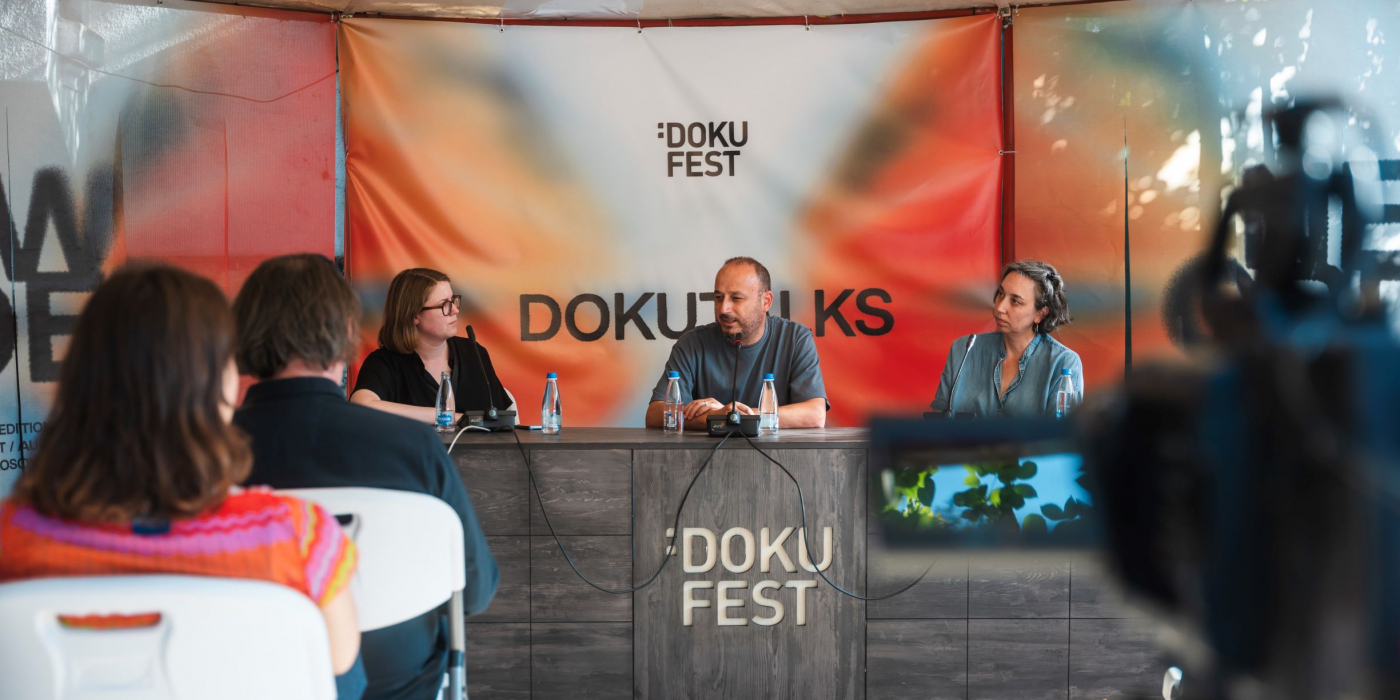08/08/2024
As always, 5 o’clock awaits the Dokufest audience at the ever-sunny Shani Efendi venue for challenging and insightful discussion on documentaries, festivals, directors and everything that leads the way to the silver screen. Short films seem to have a particular audience and the question of bringing this audience in undergoes through cultural and film programs.
The ways to make visible a short film are not traditional and often there are certain paths that make them successful, and in this talk the panelists, Anna Henckel-Donnersmarck (Berlinale Shorts), Samir Karahoda (Dokufest), moderated by Sigrid Hadenius-Ebner (Uppsala International Short Film Festival) delve into their approaches on how their experience has taught them the way to making short films accessible.
This panel in collaboration with Talking Shorts, an online magazine solely dedicated to reviewing short films set the tone for this talk emphasizing the need to discuss how films are actually received and how they find their audiences. Starting with how they were first presented to the scene, Henckel-Donnersmarck, explained in detail that her road in working with short films, started as a selector of the latter in different festivals and that paved the way for her to Berlinale Short where she has worked extensively for more than 15 years.
What drew her closer to the scene was the ability of filmmakers expanding and using their liberties in the way they share stories. That is what kept her interest intact throughout all the different roles she has taken as a jury member, pre-selector, working on the field with filmmakers and artists and so on.
A key moment in this discussion was not only elaborating on the matter of the form but also the creative processes behind it, that often respond to the low span attentions of the viewer, to endless possibilities of expression for filmmakers making it more challenging in using less time to tell a story, while also bringing the experimentation flare to the front. The short form (as proclaimed by the panelists, is indeed their favorite form) presents a testing opportunity on the skill set of the filmmaker and crew, while also liberating selectors and reviews of noticing more talent in a shorter amount of time.
What is actually challenging in the streamline of showcasing a film, Henckel-Donnersmarck explained the process at Berlinale, as they exclusively get entries that have never shown in festivals before. It is crucial to their ways of operation that the films have a completely fresh set of eyes which scales up the competitiveness and makes the selection process more prudent. Audiences respond to this process eagerly as the panelist said, that almost always the cinemas are fully booked and the creative content finds ways to be perceived at large.
The selection process in DokuFest, goes a little differently, says Karahoda, as the language shifts the perspectives of what to be shown where and there is a specific mindfulness to grow and bring qualitative films. But his perspective is not only of the film program selector but also that of a director of short films and in response to the agility of the format he always find a way to bring a social and political component and addressee speaking on the power sometimes we don’t think short films might have, but when done purposely and with an intent to pinpoint a problem, one might actually find a solution through speaking up and persistence.
Curating programs with short films presents a challenge, the panelists know very well, but the conversation went on a sociological and psychological aspect of what actually happens to the audiences and how they behave when presented with programs that are not well thought out in presenting diversity and emotional range.
It is important to take notice, since short films are often shown in a category accompanied by other films, so as not to affect the viewer’s stamina and unfold a range of possibilities to leave room for a laughter, a tear or maybe a sight.
Karahoda, presented another logistical facet of programming, a human side where transportation and communication sometimes glitch, and getting to know the short film, means also an opportunity to know in depth the filmmaker, especially during Q&A, and oftentimes logistics pertain the main problem in changing and reordering the program second to possibilities not dependable by the curators view per se.
Audiences are not only challenging while curating a program, but another aspect of this work is also making room for other people too, to come and ignite keenness on the stories presented in short films programs. That will remain a forever quest and that is why festivals must happen in their whole range of events because audiences and recipients define the momentum and the discussions that are held.
As above is a glimpse of the many discussions held at the Talking Shorts panel at Shani Efendi, and we urge you to be part of the other remaining DokuTalks as they are a way of reading our cinematic and collaborative culture to its best.
By: Blerina Kanxha
Photo: Furkan Çelik



